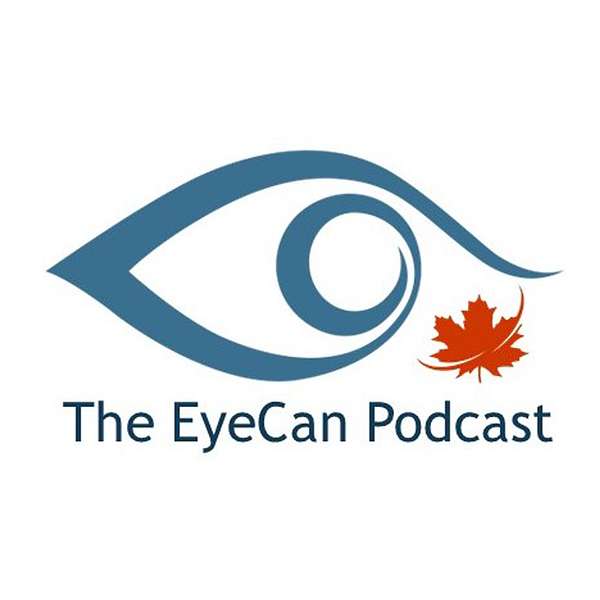
EyeCan
EyeCan: A Canadian Lens on Ophthalmology. In this series, we examine all aspects of what it means to be an Ophthalmologist in Canada; we speak with leaders in our field about their contributions and life journey; we explore new and emerging techniques and technologies in eye care. Through it all we hope to connect with our community and have those that listen understand the value of who we are and what we do for our patients. We’ll share our experiences as ophthalmologists today and tackle some of challenges we face as healthcare providers.
EyeCan has been hosted by: Dr. Guillermo Rocha and Dr. Setareh Ziai (seasons 1 and 2), Dr. Mona Dagher and Dr. Hady Saheb (seasons 3 and 4), and Dr. Heather O'Donnell and Dr. Hady Saheb (season 5 and 6).
Brought to you by the Canadian Ophthalmological Society. Seasons 1 and 2 of the EyeCan podcast were sponsored by MD Financial Affinity Grant. Seasons 3, 4 and 5 were sponsored by Bayer. Season 6 is co-sponsored by Astellas Pharma Canada, Inc. and Johnson & Johnson Vision. We thank them for their support.
Written and directed by Kim Tytler, Manager of Communications at the Canadian Ophthalmological Society, and produced by John Allaire of Allaire Strategic Works. Social media promotion by Moneika Ramsinghani, Communications Coordinator at the Canadian Ophthalmological Society.
Listening to EyeCan counts for unaccredited MOC credits. You may claim 0.5 credits per hour under Section 2 (Individual Learning) as “Educational content review”, up to 30 credits per year.
EyeCan
EyeCan Season 5, Episode 5 - Ophthalmic Pathology, with guest Dr. James Farmer
Welcome to this episode of EyeCan! Today we're chatting with Dr. James Farmer about Ophthalmic Pathology. Dr. Farmer is an Adjunct Associate Professor at Queen’s University in Ontario and an Assistant Professor at the University of Ottawa.
He graduated from the University of Ottawa Medical School, did his Ophthalmology residency there, and then went on to complete a Fellowship in Pediatric Ophthalmology, Strabismus, and Pediatric Neuro-Ophthalmology in San Francisco.
Afterwards, he wrapped up an Anatomical Pathology residency at the University of Vermont and the University of Ottawa. Dr. Farmer also wears many hats: he's the Section Chairman of the Canadian Ophthalmic Pathology Society, the Section Editor for Ophthalmic Pathology for the Canadian Journal of Ophthalmology, and a member of the Eastern Ophthalmic Pathology Society in the US.
Stay tuned as we dive into his fascinating journey and expertise in today’s conversation!
With your host, Dr. Heather O'Donnell.
Written and directed by Kim Tytler.
Produced by John Allaire of Allaire Strategic Works.
The EyeCan Podcast is made possible by support from Bayer.
Show notes:
**Be sure to attend the COPS full-day session at the COS Annual Meeting and Exhibition, June 19, 2025. Link here for details.**
What is Ophthalmic Pathology?
Ophthalmic Pathology is a subspecialty of pathology and ophthalmology that focuses on the microscopic and molecular examination of ocular tissues to diagnose and characterize diseases affecting the eye and adnexa. It plays a critical role in identifying neoplastic, inflammatory, degenerative, infectious, and systemic conditions with ocular manifestations. Through histopathology, immunohistochemistry, and increasingly, molecular diagnostics, ophthalmic pathologists provide crucial insights that guide clinical management, prognostication, and research into disease mechanisms. As imaging and artificial intelligence continue to evolve, ophthalmic pathology remains essential in correlating histological findings with clinical and radiologic data to refine diagnosis and treatment strategies.
AFIP - Armed Forces Institute of Pathology in Washington, DC. Served as a training and resource centre for all of Pathology, including Ophthalmic Pathology. Many ophthalmology leaders spent fellowship years learning and crafting the specialty, headed by Lorenz Zimmerman. AFIP closed in 2011 but still publishes Pathology reference textbooks used by practicing Pathologists.
Resources:
Canadian Ophthalmological Society (COS) Practice Resource Centre: The COS offers an extensive online repository of educational materials, including resources on ophthalmic pathology. The Practice Resource Centre provides access to webinars, articles, and clinical guidelines pertinent to Canadian practitioners. cosprc.ca
Queen's Ophthalmic Pathology Teaching Interactive Curriculum (QOPTIC): Developed by Queen's University, QOPTIC is a series of case-based modules that integrate clinical and histopathological images. This interactive curriculum is designed to enhance learning for ophthalmology residents, fellows, and practicing clinicians. Oph
Comments about EyeCan? Contact communications@cos-sco.ca and we’ll get back to you soon!
Listening to EyeCan counts for unaccredited MOC credits. You may claim 0.5 credits per hour under Section 2 (Individual Learning) as “Educational content review”, up to 30 credits per year.



